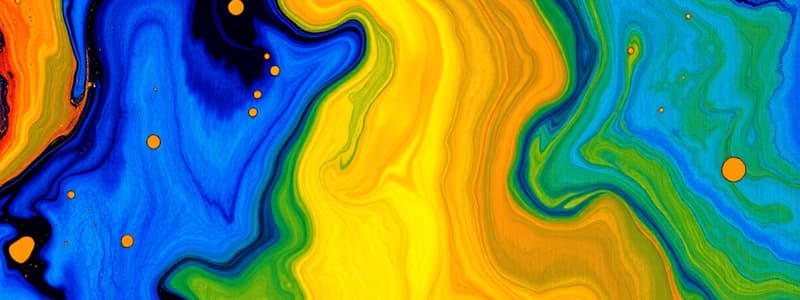Podcast
Questions and Answers
Which physical property describes the amount of matter in an object?
Which physical property describes the amount of matter in an object?
- Density
- Mass (correct)
- Melting Point
- Volume
What term describes the ability of a substance to dissolve in another substance?
What term describes the ability of a substance to dissolve in another substance?
- Solubility (correct)
- Ductility
- Luster
- Conductivity
Which of the following physical properties can be observed using the sense of sight?
Which of the following physical properties can be observed using the sense of sight?
- Odor
- Texture (correct)
- Ductility
- Mass
What is the temperature at which a substance changes from a liquid to a gas called?
What is the temperature at which a substance changes from a liquid to a gas called?
Which physical property would you associate with an object's ability to reflect light?
Which physical property would you associate with an object's ability to reflect light?
What physical property is described as the ability to conduct heat or electricity?
What physical property is described as the ability to conduct heat or electricity?
Which term refers to the resistance of a material to being broken easily?
Which term refers to the resistance of a material to being broken easily?
What describes the amount of mass per unit volume in a substance?
What describes the amount of mass per unit volume in a substance?
Flashcards are hidden until you start studying
Study Notes
Physical Properties
- A physical property is a characteristic of a material that can be observed or measured without changing its identity.
- Physical properties can be observed using our five senses or measured.
- Examples of physical properties that can be observed without changing the identity of the object:
- Color
- Texture
- Shape
- Mass (how much matter an object contains, also referred to as how heavy something is)
- Volume (how much space something takes up)
- State (solid, liquid, gas).
- Density (the amount of mass packed into a certain volume)
- Conductivity (how well a material conducts heat or electricity).
- Solubility (how well a material dissolves in another material).
- Magnetism (the ability to be attracted to a magnet).
- Ductility (the ability of a material to be stretched or bent into a wire without breaking).
More Physical Properties
- Melting Point: The temperature at which a substance changes from a solid to a liquid.
- Boiling Point: The temperature at which a substance changes from a liquid to a gas.
- Density: The relationship between mass and volume.
- Appearance: The color and the shape of an object.
- Luster: The quality of shining by reflecting light. This can be glassy, gloss or glitter.
- Brittleness: The ability of a material to easily break, damage or be destroyed.
- Odor: The way something smells
- Conductivity: The ability of a material to conduct heat or electricity.
- Magnetism: The attraction of a material to a magnetic field.
- Ductility: The ability of a material to be drawn out into a thin wire.
Studying That Suits You
Use AI to generate personalized quizzes and flashcards to suit your learning preferences.




